-
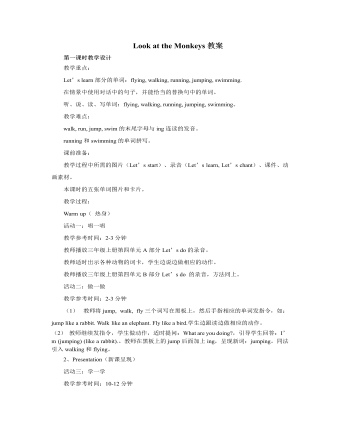
人教版新课标PEP小学英语五年级下册Look at the Monkeys教案
教学参考时间:5分钟(1)教师课前在教室里藏好一些动物和人物的图片。(2)给全班学生一分钟时间寻找。(3)请找到图片的学生根据图片上的人物或动物正在做的动作表演对话。活动七:猜一猜教学参考时间:5分钟(1)教师一只手拿一张图片,另一只手用白纸遮住图片,一边慢慢抽动白纸,一边问:What are the…s doing? 学生用They are…猜图片中的内容。(2)猜对的学生上台主持游戏。(3)教师也可以在白纸上剪几个圆洞盖在图片上,慢慢移动白纸的位置让学生猜白纸下面图片的内容。(4)也可以分组利用词卡做该游戏。4、Consolidation and extension (巩固与扩展)活动八:练一练教学参考时间:5分钟(1)活动手册Ask and write. 让学生看一看两个表格,找规律做问答,然后再把表格中所缺单词写出来。(2)活动手册Let’s find out.让学生仔细观察两幅图找出不同的地方,并用英语表达出来。活动九:小结教学参考时间:1分钟本课我们学习了如何询问他、她、它们正在做什么What are they doing? 及回答:They are…5、板书
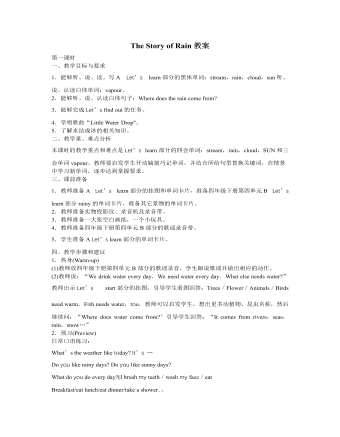
人教版新课标PEP小学英语六年级上册The Story of Rain教案
(2)教师说:“I am going to plant a flower on the weekend.But I don’t know hoⅥ do that.Can you tell me? Who knows?”教师提示学生可以适当用中文解释。如果有学生举手,教师就问:“OK.How d0 you do that?”引导学生回答。“First,put the seeds in the soil.”然后,教师接着说:“What should I do then? 引导学生回答“Water it. (3)教师说:“Zhang Peng is talking to h is teacher.Now Let’s see what they talking about.”学生翻开学生用书,教师放录音,学生跟读。教师解释In several days的意思是几天以后。”教师板书四会句型:How do you do that? What should you do then?学生仿写。 (4)同桌学生进行对话替换操练,可以谈论西瓜(watermelon)、小麦(wheat)等植物的种植过程。然后选几组在班上表演对话。 (5)教师指导学生运用主句型编对话。以下对话供参考: A:How do you clean the classroom? B:First.sweep the floor. A:What should you do after that? B:Then clean the desks and chairs.wash the windows. 4.巩固和延伸(Consolidation and extension) (1)做本单元B Let’s talk部分的活动手册配套练习。

人教版新目标初中英语七年级下册Where is the post office教案2篇
Period 2 (3a----Section B 2c)Preview(Pre-task): Key points: What laAdd another information about their pen pals----their language on the cardnguage does she/he speak?She/He speaks....Does she/he have any brothers and sisters? Does she/he speak English?Preview(Pre-task): Add another information about their pen pals----their language on the cardKey points: What language does she/he speak?She/He speaks....Does she/he have any brothers and sisters? Does she/he speak English?Step 1 Revision1.Revisionand dictation of the new words 2.Revise the drills they learned yesterday.(by pairwork and grammar exercise)Step 2 Leading-inT has a conversation with one student. The conversation is following:---Do you have a pen pal?---Yes, I do.---What's your pen pal's name? ---His/Her name is....---Where is your pen pal from? ---He/She is from...---Where does he/she live? ---He/She lives in....---What language does he/she speak?He/She speaks...Write the new words on the Bb. They are following: EnglishChineseJapaneseFrenchStep 3 LearnLearn the new words with the whole class.Finish 3a with the students3b Pairwork T still does an example with one student Then the Ss practise in pairs. The example is following:--Curry Muray is my pen pal. He is from the United States.---What language does he speak?
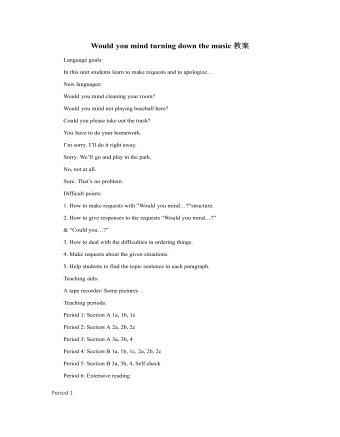
人教版新目标初中英语八年级下册Would you mind turning down the music教案
Step 4. Group work (4)1. Ask a pair of students to read the dialogue. Say, This activity provides speaking, listening and writing practice using the target language.2. Ask students to complete the work in groups.3. Check the answers with the whole class. 4. Explain some of the language points. Step 5. Word review (Self check 1)1. Ask students to read the words and the phrases given. 2. Fill in the blanks with proper forms of these words to complete the sentences. 3. Check the answers with the whole class. Homework:Do activity 2 on page 57 after class. Period 6Teaching aims: 1. Teach vocabulary words and the useful expressions. 2. Enable the students to learn etiquette in different culture. 3. Help the students learn how to behave politely in public places and in daily life. Teaching procedures:Step 1. RevisionHelp students to review the function of making requests through a free talk. Then lead them to the topic of etiquette. Explain the meaning of etiquette. Or, ask students to look it up in the dictionary. Step 2. Pre-reading (Section 1)1. Ask students to read the picture and make a list with their partner about how many rules of etiquette can be seen being broken.

新人教版高中英语必修3Unit 5 The Value of Money-Discovering Useful Structures导学案
4.They were going to find someone to take part in their bet when they saw Henry walking on the street outside.[归纳]1.过去将来时的基本构成和用法过去将来时由“would+动词原形”构成,主要表示从过去某一时间来看将要发生的动作(尤其用于宾语从句中),还可以表示过去的动作习惯或倾向。Jeff knew he would be tired the next day.He promised that he would not open the letter until 2 o'clock.She said that she wouldn't do that again.2.表示过去将来时的其他表达法(1)was/were going to+动词原形:该结构有两个主要用法,一是表示过去的打算,二是表示在过去看来有迹象表明将要发生某事。I thought it was going to rain.(2)was/were to+动词原形:主要表示过去按计划或安排要做的事情。She said she was to get married next month.(3)was/were about to+动词原形:表示在过去看来即将要发生的动作,由于本身已含有“即将”的意味,所以不再与表示具体的将来时间状语连用。I was about to go to bed when the phone rang.(4)was/were+现在分词:表示在过去看来即将发生的动作,通常可用于该结构中的动词是come,go,leave,arrive,begin,start,stop,close,open,die,join,borrow,buy等瞬间动词。Jack said he was leaving tomorrow.

新人教版高中英语必修3Unit 5 The Value of Money-Listening &Speaking教学设计
Step 4: Listen again and decide if the following statements are true (T) or false (F).1 It was the first time Chen Liyan's story was reported. T口 F口2 Chen found 10,000 yuan in a small plastic bag in Taiyuan railway station口 F口3 Wang Zheng apologized to Chen because he couldn't offer her more money. T口 F口4 Chen took out a large loan to cure her daughter, T口 F口5 Wang set up a fundraising website for Chen's daughter after Chen told him about her situation. T口 F口Step 5:After listening, discuss the questions.1 What kind of person do you think Chen Liyan is?Chen Liyan is generous and honest because she returned a large sum of money to the owner.2 Did Chen return the money because she didn't need it?No. She returned the money because it was the right thing to do. Evidence for this is that she refused to accept the reward money because she felt that it had not been earned. 3 Is it common for people to do what Chen did?It depends on the culture. In some countries it is quite common to return money that has been found. In other countries, people believe "Finders are keepers!" 4 How did Wang Zheng feel about the return of his money?He must have been very happy and relieved to have gotten his money back. We know this because he thanked Chen repeatedly and even offered her a reward.5 Why did Ma Dongbao tell Wang about Chen's family?He must have had great sympathy for Chen and her daughter and wanted to help them.'We know this because he arranged help for them. 6 How did the news reporter feel about Chen's actions?The news reporter felt that it showed that money wasn't the most important thing in life. We know this because the reporter told us that this is what Chen believes. and then said, “that's a great attitude to take."

新人教版高中英语必修3Unit 5 The value of money-Reading and Thinking教学设计二
? Could you offer me some kind of work here?? I don’t want your charity, I just want an honest job.? Careless: I landed in Britain by accident.Step 7:Consolidation.? Find Henry? Roderick and Oliver were I .making a bet when they saw Henry, a poor young man. ? Know Henry? About a month ago, Henry was sailing and later he found himself carried out to sea by a strong wind. Fortunately, he 2.was spotted by a ship. And it was the ship that brought him to 3.England? Offer money to Henry ? Oliver and Roderick gave Henry a letter and told him that there was money in it. They 4.persuaded him to accept it, and made him 5.promise that it wouldn't be opened until 2 o'clock.Step 8:Language pointsa large amount of: a large quantity of; a great deal ofe.g. They bought a large amount of furniture before they moved their new house.make a bet: make an arrangement to risk money, etc. on an event of which the result is doubtful.e.g. We made a bet on the result of the match.permit sb to do something: allow somebody to do somethinge.g. My mother doesn’t permit me to ride in the street after it rained.by accident: as a result of chancee.g. I only found it by accident.stare at: look at somebody or something with the eyes wide open in a fixed gaze( in astonishment, wonder, fear, etc)to be honest: to tell you the truth; to be franke.g. To be honest, I don’t think we have a chance of winning.Step7 Homework:What do you think will happen to Henry? Will the bank-note help him or get him into trouble?

新人教版高中英语必修3Unit 5 The Value of Money-Reading and Thinking教学设计一
Everybody wants to get wealth.In today’s material world,making money or becoming wealthy symbolizes a person’s success and capability. Many people just make every effort, pay any price to attain greater wealth. With money,they can buy nice, large apartments in nice neighborhood. With money they can own luxurious cars. Wealth seems to bring all happiness in life.But is wealth the only road to happiness? Not really. There are many things in the world, which are beyond the means of money, such as friendship, love, health and knowledge. People are so preoccupied with struggling for money that they have no time or would not take the time to form or maintain friendship. What happiness can they feel living as lonely miserable creatures without love or friends in the world even if they accumulate tremendous wealth?In my opinion, people can’t do anything without money, but money is not everything. What money will bring you depends on your personal belief and goal in life. If you are kind enough to help others, especially the poor, money is a good thing to you. With it, you can do much more for the benefit of people and your country, and it will add to your own happiness. If you want money just for your own needs, you’ll never be satisfied or happy. In a word,you should have money spent for more people. Only then can money be the source of your happiness.Step 8 Homework4 students in a group, one acts Roderick, one Oliver, one servant and the fourth one acts Henry Adams, then listen to the tape, pay more attention to the difference between American English and British English in pronunciation, stress, tone.

新人教版高中英语必修3Unit 5 the value of money-Reading For Writing教学设计一
【参考范文】Narrator:(Henry is smiling as he leaves the restaurant. As he is walking down the street, he sees a sign for a place that cuts hair. He decides to get it cut. )H=Henry;B=Barber;R=rude manH:Good afternoon, I'd like to get a cut, if I may. (The barber looks at Henry's hair and continues cutting another man's hair. )Er, I'd really like a haircut. As you can see it's much too long. B:(in a rude manner) Yes, I can see that. Indeed, I can. H:Fine, well I'll have a seat then. (He sits in one of the barber's chairs. The barber turns to look at Henry. )B:It's quite expensive here, you know!Are you sure you can afford it?H:Yes. I think so. (In comes the rude man. )R:Hey you there. I need a haircut quickly. Can you do me straightaway?B:All right, then, get in the chair and I'll see what I can do. R:Thank you. (sits down in one of the barber's chairs)H:Excuse me, but I was here first. Aren't you going to do my hair first?B:This man's in a hurry. H:Well so am I!I insist that you cut my hair first. B:OK, but I'll have to be quick. This gentleman is waiting. H:Thank you. (They both become quiet. After his hair is cut, the barber tells Henry how much he must pay. Henry shows the barber the bank note. )B:Why, Mr . . . (looks shocked)H:Adams. Henry Adams. I'm sorry, I don't have any change. R:You're that Mr Adams! Well,I'm glad I waited or I might never have known it was you. B:Why, Mr Adams, please don't worry!(wearing a big smile) Nothing to worry about!Nothing at all!Please come back any time, even if you only need too little hairs cut!It will be my honour to serve you!

新人教版高中英语必修3Unit 5 The Value of Money- Discovering Useful Structure教学设计
Step 3 Meaning1. 过去将来时表示从过去某一时间来看将要发生的动作或存在的状态, 常用在宾语从句中。一般由“would/should +动词原形”构成。She hoped that they would meet again someday. 她希望将来有一天他们能再见面。2. was/were going to+动词原形: 表示过去将要发生或很有可能发生的动作, 常用于口语中, 表示预言、意图或者打算等。He was going to start work the following week. 他打算下星期开始工作。3. was/were about to do: 常用来表示即将发生的动作, “刚要/正要做……”。注意该结构不与任何时间状语连用。I felt that something terrible was about to happen. 我感到某种可怕的事情即将发生。4.was/were to do: 表示“曾计划做某事”, 如果表示“本来计划做某事, 动作没实现”, 则需用 “was/were to have done”。She said she was to have told me about the accident. 她说她本来想告诉我关于事故的事。5.Start, go, come, leave, see, meet等动词的过去进行时: 表示就过去某一时刻而言即将发生的动作。She was coming later. 她随后就来。I had just put on my overcoat and was leaving to visit a friend of mine. 我刚穿上外套要去看我的一个朋友。

新人教版高中英语必修3Unit 5 The Value of Money-Listening &Speaking&Talking教学设计
4. A:We’d like to have someone to say a word at the beginning to welcome the group.B:↙Who?A:We thought that you or Dr.Johnson might do it.B用降调说Who,其意思是问,对方想让谁在开场时致欢迎词。Step 6 Pronunciation---Practice1. Listen to the short conversation and mark the intonation with ↗, ↙ or ↙, ↗. Then discuss with a partner what they intend to convey by using different intonation.Owner: You know what ?↗ It’s a million-pound bank note↙.Waiter 1: Really ?↗(question)Waiter 2: Really !↙(unbelievable and surprised)Waiter 3: Really ?!↙↗(first question then surprised)2. Listen to the conversations. Underline the parts that are stressed and mark the intonation. Then talk about the implied meanings of the responses with different intonations. Listen again and repeat.1) Henry: It’s a nice suit.Owner: Oh, it’s perfect!↙(The intonation means it is very suitable for Henry.)2) Henry: Well, that’s very kind of you.Owner: Kind, sir ?↗(what you said is not right) No, it’s kind of you. You must come whenever you want and have whatever you like. Just having you sit here is a great honour !!↙(welcome you to come again)3)Henry:Well, to be honest, I have none. Oliver:(happily) What luck!(excited) Brother↗, what luck!↙(It means “Didn’t you hear it?”)Henry: Well, it may seem lucky to you but not to me!↗(angry) If this is your idea of some kind of joke, I don’t think it’s very funny. Now if you’ll excuse me, I ought to be on my way.↙(If so, I would leave.)Roderick: Please don’t go↙...(hope Henry can wait for a moment)Part B Viewing and Talking---Describe people’s changing attitudes in a film clipStep 1 Before-listening---Tell the filmYou are going to watch part of the film The Million Pound Bank Note. Look at these photos and guess what happens in the film.

新人教版高中英语必修3Unit 5 The Value of Money-Reading for Writing教学设计二
2. 您能看到, 我头发太长了。You can see that my hair is much too long.3. 无论什么时候, 只要您想回来就回来。Please come back whenever you want.4. 您仅有很少的头发要理! You only have too little hair to cut !5. 为您服务是我的荣幸!It is my honour to serve you!Step 9 Writing(Henry is walking down the street when he sees a sign for a place that cuts hair. He decides to have it cut. )H=Henry B=BarberH: Good afternoon, I’d like to have my hair cut, if I may. (The barber looks at Henry’s hair and continues cutting another man’s hair. ) Er, I’d really like a haircut. As you can see it’s much too long. B: (in a rude manner) Yes, I can see that. Indeed, I can. H: Fine, well, I’ll have a seat then. (He sits in one of the barber’s chairs. The barber turns to look at Henry. )B: It’s quite expensive here, you know! Are you sure you can afford it?H: Yes. I think so. (After his hair is cut, the barber tells Henry how much he must pay. Henry shows the barber the bank note. )B: Why Mr. . . (looks shocked)H: Adams. Henry Adams. I’m sorry. I don’t have any change. B: Please don’t worry! (wearing a big smile) Nothing to worry about! Nothing at all! Please come back whenever you want, even if you only have too little hair to cut! It will be my honour to serve you!Step 10 Pair workExchange drafts with a partner. Use this checklist to help your partner revise his/her draft.1. Are all the elements of a play included and in good order ?2. Do the character use suitable language ?3. Are the stage directions clear and useful ?4. Is the plot clear and exciting enough ?
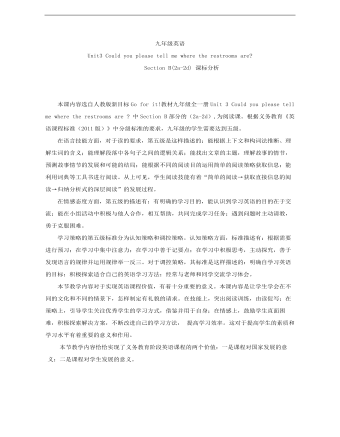
初中英语人教版九年级全册《Unit 3 Could you please tell me where the restrooms are》课标分析说课稿
学习策略的第五级标准分为认知策略和调控策略。认知策略方面,标准描述有:根据需要进行预习;在学习中集中注意力;在学习中善于记要点;在学习中积极思考,主动探究,善于发现语言的规律并运用规律举一反三。对于调控策略,其标准是这样描述的:明确自学习英语的目标;积极探索适合自己的英语学习方法;经常与老师和同学交流学习体会。
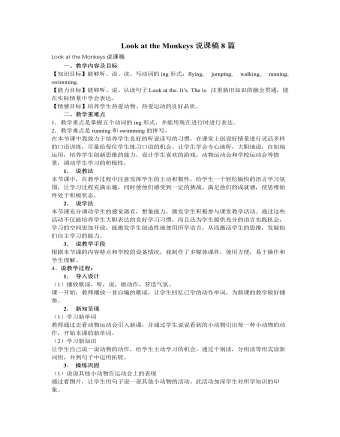
人教版新课标PEP小学英语五年级下册Look at the Monkeys说课稿8篇
四、拓展提高,评价促学1、欣赏故事。在学习完所有内容后,老师请学生继续听、看和试着说出这个童话故事的一部分,然后通过拜访几个动物的家庭,利用我们眼睛看到的事物,我举例示范了一个对话,并根据听到的内容将所缺少的单词填写进去。在原来听、说、读的基础上,增加了写的环节,真正完成了单词的四会要求。2、童话表演。这个童话故事将所有的内容综合在一起,是单词与句型的综合运用。在学生听说读写的训练过程之后,两人小组的表演培养了学生的合作学习能力,让学生们通过师生、生生、小组等不同的合作方式,学会倾听,学会评价。3、中心升华。最后,我利用小鸟的眼睛,我们一起欣赏了大千世界各种美丽的事物,让学生学习之余,能够有所减压和感受,连青蛙都喜欢上整个世界,跳出了小井,感受整个世界的美好。五、课堂小结,作业布置(1) 抄写所学的四会单词。(2)将童话剧表演给父母看。这一环节培养了学生语言的运用能力,体验学习英语的成功带来的喜悦,达到学以致用的目的。
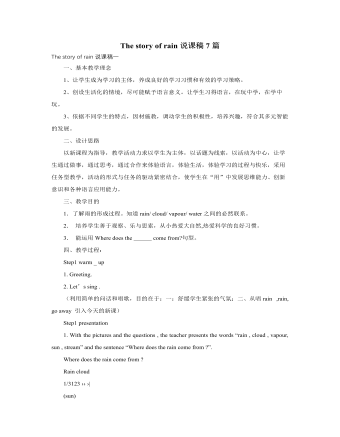
人教版新课标PEP小学英语六年级上册The story of rain说课稿7篇
4,在向学生提出了“ the water cycle”后,为了学生能够形象地解释,我马上播放flash “the water cycle”,5,通过观看flash “the water cycle”,学生已经能够理解水循环的意思,所以在理解的基础上,我出现了今天的chant,利用Chant的目的:1、记忆单词;2、熟悉新句型;3、使课堂更生动、活泼,让学生学得轻松。6,最后,播放了一个“一滴水”flash ,把本课的主题升华,让学生在一堂课中能够有所学有所悟。Water is useful(有用的). Let’s love it and protect(保护) it. Step 4 Homework在有限的时间里,通过练习作业本上的几个题目,来看看学生对本课的学习掌握了多少,同时也反馈给老师一些信息,看看本课哪些地方需要下一课时补充巩固一下。整堂课下来,自身受益匪浅,当然也发现了很多需要改进的地方,作为一个新教师,教学经验不足,课堂应变能力不强,教学用语生疏等等,希望在这里可能得到各位老师的指点和教导。
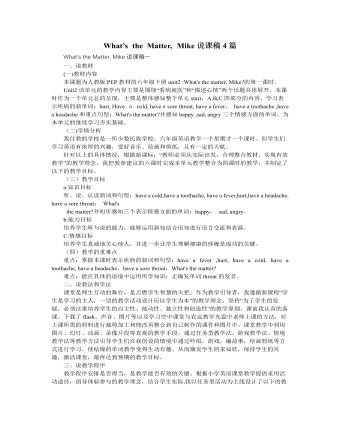
人教版新课标PEP小学英语六年级下册What’s the Matter, Mike说课稿4篇
请个别学生朗读、说出所缺字母并用肢体语言或表情说明意思。4.活动二:a guessing game利用卡片复习上节课的句型。[设计意图] 日常口语操练为学生营造了一个良好的学习氛围,英语歌曲优美动听,口语操练生动有趣,为学习新课打下了良好的基础.Step2Presentation (7 minutes) 活动三Learn the dialogue1.导看:教师用投影仪展示自己的一张旅游的照片和一张不及格的试卷,以此引出 词组a big trip, failed the math test.2.听对话录音,学生跟读。3.教师带读。4.两人一组分角色进行对话练习。5.分两大组朗读对话,对表现好的组予以表扬.6.师生就对话内容进行问答:T:Who looks happy? Why?S:Liu Yun looks happy. She is going on a big trip.T:Who looks sad? Why? S:Sarah looks sad. She failed the math test.[设计意图]使用实物展示来呈现新词组能加深学生对词组的理解和记忆.对于枯燥的句型朗读,采用多种不同的方式,如师生互动、分角色朗读,分组比赛等,避免学生产生疲劳感.
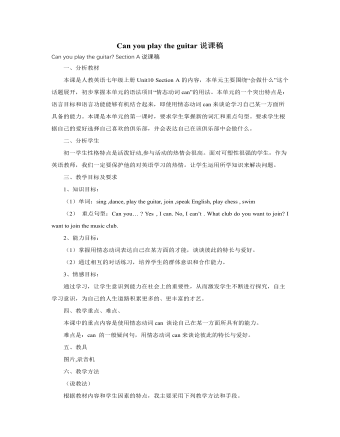
人教版新目标初中英语七年级上册Can you play the guitar说课稿
教材分析1、教材地位作用本单元围绕着学习情态动词can 的用法,来表达自己在某一方面所具有的能力。2、教学目标(知识目标、能力目标)(1)知识目标:复习情态动词can 的用法。(2)能力目标:通过学习can ,达到能灵活谈论自己的喜爱与特长,培养一种群体意识。3、重点和难点:(1)重点:情态动词can的一般问句的用法。(2)难点:利用上下文语境及略读技巧。二、教法:让学生默读课文(限时),让学生在短时内抓住课文的重点,划出关键词,从中亲自感受一下略读的技巧,然后老师加以指导。三、学情与学法针对学生在不理解情态动词can 的一般问句的情形下,反复阅读课文,从而加深对本单元前两页所学can用法的印象,从中真正感悟can的用法.
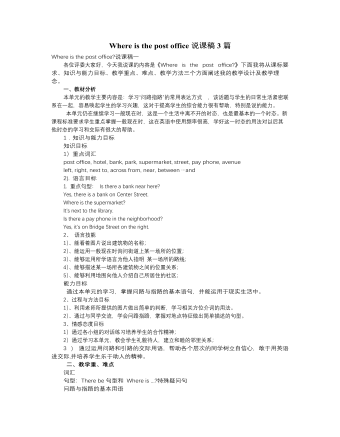
人教版新目标初中英语七年级下册Where is the post office说课稿3篇
Vocabulary:post office, restaurant, bank, supermarket, avenue, pay phone, park, dirty, clean, left, right, next to, across from, near, between, in front of, behindRecycling: hotel, street, new, big, small, busy, Do you want to…?Learning Strategies:Using what you knowDeducingPersonalizingSection ACreate plots and scenes to guide the new lessonThe main content is to learn to ask for and give directions in conversations by introducing some buildings in Section A, so we can adopt the Audiovisual Guiding Method: At first ,review the prepositions that the students have learned, then the teacher can teach some nouns about buildings by showing some pictures or projecting flashcards about some buildings.1. Show a picture of a bank.T:Look at this picture. What place is it ?S:It is a bank.T:Spell it.S: B-A-N-K .Teach other new words : post office, park, supermarket, payphone, street, .Show a map and let students practice in pairs.Is there …… ?Yes, there is. /No, there isn’t.2. Consolidation: Tell us the way to your school.T: Where is the …?S: It’s ….Teach the prepositionsNext to,across from,near,between,in front of,behind.Step1: .Learn some nouns about buildings first, and then the teacher communicates with the students.
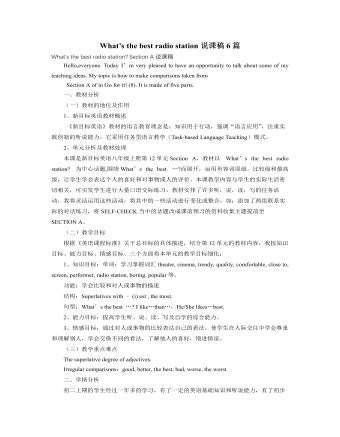
人教版新目标初中英语八年级上册What’s the best radio station说课稿6篇
3、重点和难点:重点:学会用形容词的最高级来对事物或人物进行描述。难点:形容词的最高级加est还是加most.二、 说教法:为了更好的突出重点,突破难点,我主要采用了:1、任务型教学法:新课标倡导的“玩中学,学中玩”的理念很受学生欢迎。例如,阅读文章时,我设计了一张表格,让学生阅读后完成表格并复述。培养学生逻辑分类与表述能力。2、 竞赛教学法:根据初中生争强好胜的性格特征,我每堂课都进行俩俩对话,激发学生兴趣,给学生创造外语语言氛围,培养学生集体荣誉感。三、说学法:1、 善于抓住用英语交际的机会,充分感知,积极体验,大胆实践。例如在导入新课时的One minute dialogue(每组都有一次机会),pairwork (每人都有机会),groupwork(每组一次机会)。2、 积极参与,善于合作。例如本课设计了几个任务,操作简单,学生一定很感兴趣并且积极参与,从而合作完成任务,培养了团队精神。

人教版新目标初中英语八年级下册What were you doing when the UFO arrived说课稿10篇
知识目标:a. 掌握新单词:shout; jump down; climb; scaredb. 掌握并会运用句型:—What were you doing at 8o’clock last night?—I was doing my homework.技能目标:a. 能听懂听力材料的内容,并能做出相应的练习。b. 提高学生听和说的能力。二.教法与学法本节课采取了任务型教学法,通过让学生完成不同的任务来完成不同的教学活动。本节课采用了Brainstorming、Pairwork、Groupwork等活动,实现了让学生说的目标。通过补充故事让学生巩固新学的单词,通过小组的活动让学生参与到问题的讨论中,让学生开口说。三.学情分析通过几个学期的学习,学生已经积累了一定的词汇,并熟练掌握了一些句型。本节课的热身部分是给了学生一个问题:What were you doing at 8 o’clock last night? 通过学生本身的活动来引起他们的兴趣,并对前面的内容进行了复习。四.教学重难点a.掌握本节课所学新单词:shout; jump down; climb; scaredb.掌握和巩固本单元的句型和语法(过去进行时)

